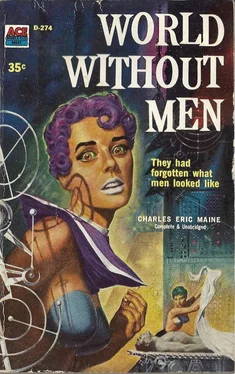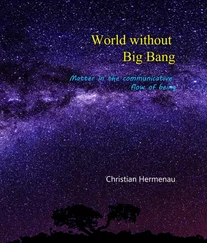Charles Maine - World Without Men
Здесь есть возможность читать онлайн «Charles Maine - World Without Men» весь текст электронной книги совершенно бесплатно (целиком полную версию без сокращений). В некоторых случаях можно слушать аудио, скачать через торрент в формате fb2 и присутствует краткое содержание. Город: New York, Год выпуска: 2013, Издательство: Ace Books, Жанр: Фантастика и фэнтези, на английском языке. Описание произведения, (предисловие) а так же отзывы посетителей доступны на портале библиотеки ЛибКат.
- Название:World Without Men
- Автор:
- Издательство:Ace Books
- Жанр:
- Год:2013
- Город:New York
- ISBN:нет данных
- Рейтинг книги:4 / 5. Голосов: 1
-
Избранное:Добавить в избранное
- Отзывы:
-
Ваша оценка:
- 80
- 1
- 2
- 3
- 4
- 5
World Without Men: краткое содержание, описание и аннотация
Предлагаем к чтению аннотацию, описание, краткое содержание или предисловие (зависит от того, что написал сам автор книги «World Without Men»). Если вы не нашли необходимую информацию о книге — напишите в комментариях, мы постараемся отыскать её.
World Without Men — читать онлайн бесплатно полную книгу (весь текст) целиком
Ниже представлен текст книги, разбитый по страницам. Система сохранения места последней прочитанной страницы, позволяет с удобством читать онлайн бесплатно книгу «World Without Men», без необходимости каждый раз заново искать на чём Вы остановились. Поставьте закладку, и сможете в любой момент перейти на страницу, на которой закончили чтение.
Интервал:
Закладка:
Cordelia glanced hastily around the frozen circle of her colleagues and was encouraged by the dismay reflected in their expressions. She pointed to the baby. “This is no longer a test embryo, Mistress; it is a live independent human being. To destroy it would be murder.”
“Not in law” said the Mistress smoothly. “The Department of Applied Cytology realized a long time ago that special provision would have to be made for experimental embryos undergoing development tests in laboratories At one time all such living embryos were regraded as individuals — premature humans, in a sense — but obviously such an attitude could only hinder the progress of scientific research; therefore, the law was modified. All experimental embryos of laboratory origin are regarded as expendable test material unless application is made to the Department of Mortic Revenue for recognition of any particular test embryo as a human individual in law.”
“Then let us make the application now.”
“There would be no point. Mortic policy is determined by world brain computations, and the brain has already given its verdict. The Department of Mortic Revenue could not now give recognition to test four-six-five.”
A profound silence blanketed the group. Only the faint remote ticking of the thermostats in the incubators disturbed the noiselessness, as if underlining the significance of the Mistress’s words. Incubators, cytological experiments, embryos, expendable material — the jargon of a cold, dispassionate science. For a few moments everyone, it seemed, except the Mistress, was looking at the baby.
“Beware of sentiment,” said the Mistress, her voice controlled and calm. “What you see in the crib in the result of a successful experiment in micro-cytology, the end product of cell division and differentiation. It is a test subject, a specimen. There is no question of human status. Other embryos have had to be destroyed, and there is no difference of principle in this case.”
The baby was unconcernedly sucking its thumb, not caring about status or principles. Cordelia noted the clear blue eyes moving restlessly as if trying to make sense out of the shapes and lights and human figures beyond the plastic walls of the crib. They were intelligent eyes, human eyes.
Cordelia said: “May we know why the world brain thought it desirable to destroy this — this child?”
“It is not a child; it is a test specimen,” said the Mistress sharply. “I have already warned you about the dangers of sentiment. Judgement must always be free from emotional contamination.”
“And from mercy?”
“To talk of mercy in connection with a test specimen is meaningless. However, let me explain how the verdict was obtained. Perhaps it will help to resolve your doubts and demonstrate the inevitable rightness of the brain’s decision. The problem was basically one of introducing an unknown variable factor into a balanced social equation. We had to examine the many millions of permutations and combinations of possible social change that could result from the introduction of one live male into society as it now exists. We took into account the question of male reproduction, and even assumed for the purposes of computation that within a certain number of generations the male sex, if it were perpetuated, might equal the female in numbers, as was once the case. We found that a stable heterosexual society might be possible in five thousand years. But during the intervening period there would be chaos. Society as we know it would disintegrate.”
“But why?”
The Mistress sighed patiently. “Because of the syndrome, the perversion-neurosis. It was caused by the elimination of man. If you confront a pervert-neurotic with the cause of all the trouble and try to enforce a reversion to normal behaviour, the result will almost certainly be hysteria. And hysteria on a mass basis is a terrible thing. It means an end to rational thought and conduct, a disruption of normal activity. Worse still, it means a lack of control, racial insanity, and racial suicide.”
“You mean,” said Cordelia ominously, “that once women realized that men were returning into their lives, they would rebel against this regimentation, this carefully planned Lesbian society. They would laugh at the syndrome, as you call it, and tear your beautifully organized social structure to pieces in sheer mutiny.”
“You know that’s not true,” the Mistress said quietly. “It is not a question of rebellion or mutiny, for there is nothing to rebel against. I repeat: Society is stable. The subversive element is negligible, and we keep it under control by deep hypnotic techniques. The problem is purely one of hysteria. Human behaviour would become unpredictable, and that is a bad thing. There would be widespread unhappiness, and that is even worse. There might be outbreaks of violence, suicide, and non-co-operation in parthenogentic matters. I’m sure you would not like to see this happen.”
“If the world knew that a male child had been born there would be a sudden change in female psychology.”
“That is exactly what I said — hysteria.”
“You’re afraid that the government would be undermined, would lose its power to govern. You’re afraid that someone might decide to wreck the world brain in the cause of freedom and independence. Well, let them wreck it! Is stability so important after all, or even happiness? Are human beings the better for being predictable, even though they are pervert-neurotics? Perhaps five thousand years of hysteria and chaos might be worth-while if it results in a new kind of society with both males and females. Even the beasts of the field have that privilege!”
Cordelia became silent, alarmed and astonished at the trend of her speech. The words had spilled themselves from her brain without conscious thought, and they did not even represent her true attitude. She was a loyal member of the State, a trusted government scientist, and never in her life had she voiced or even entertained ideas of such a treasonable nature, nor did she even believe what she had just said. The words had tumbled from some dark region beyond consciousness, uncontrollably, as if generated by some new irrational twist in her brain. Hysteria, she thought, suddenly afraid. The male child had started it. Test four-six-five: the pink specimen in the plastic case. The Mistress had been right, and the syndrome was real. Already hysteria was insidiously affecting her judgment, injecting unreason into her thoughts, introducing an element of unpredictability into her reactions.
She saw her diagnosis confirmed in the hard set of the Mistress’s eyes and in the restrained alarm of her colleagues. She had confirmed, by her words, everything that the Mistress had said, and it was too late now to retract or apologize. The inevitable would happen: she would be taken away to a psycho-neural centre and subjected to deep hypnosis to rid her mind of the distortion that had revealed itself so clearly. In time she would be transferred to a new post in a new city. And test four-six-five would be destroyed anyway.
She had risked her future for nothing.
“I think,” said the Mistress, “that you had better come with me, Cordelia. Meanwhile, destroy test four-six-five!” a junior scientist, not yet thirty, of an introspective nature. She listened closely without change of expression, but did not contribute to the general discussion.
“Whoever would have imagined… Cordelia, of all people.”
“You can never tell. The quiet, conscientious ones are often the most unreliable.”
“But to behave in that way…”
“And just after the Mistress had been talking about hysteria…”
“It illustrates the danger of specialization. Cordelia had worked for a long time on test four-six-five. She must have developed some emotional attachment.”
Читать дальшеИнтервал:
Закладка:
Похожие книги на «World Without Men»
Представляем Вашему вниманию похожие книги на «World Without Men» списком для выбора. Мы отобрали схожую по названию и смыслу литературу в надежде предоставить читателям больше вариантов отыскать новые, интересные, ещё непрочитанные произведения.
Обсуждение, отзывы о книге «World Without Men» и просто собственные мнения читателей. Оставьте ваши комментарии, напишите, что Вы думаете о произведении, его смысле или главных героях. Укажите что конкретно понравилось, а что нет, и почему Вы так считаете.












